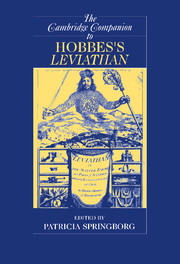Book contents
- Frontmatter
- General Introduction
- Part I: Of Man
- Part II: Of Commonwealth
- Part III: Of a Christian Commonwealth
- Part IV: Of the Kingdom of Darkness
- Part V: Hobbes’s Reception
- 18 Hobbes and His Contemporaries
- 19 The Reception of Hobbes’s Leviathan
- 20 Clarendon against Leviathan
- 21 Silencing Thomas Hobbes: The Presbyterians and Leviathan
- Bibliography
- Index
- Series List
18 - Hobbes and His Contemporaries
from Part V: - Hobbes’s Reception
Published online by Cambridge University Press: 28 November 2007
- Frontmatter
- General Introduction
- Part I: Of Man
- Part II: Of Commonwealth
- Part III: Of a Christian Commonwealth
- Part IV: Of the Kingdom of Darkness
- Part V: Hobbes’s Reception
- 18 Hobbes and His Contemporaries
- 19 The Reception of Hobbes’s Leviathan
- 20 Clarendon against Leviathan
- 21 Silencing Thomas Hobbes: The Presbyterians and Leviathan
- Bibliography
- Index
- Series List
Summary
Hobbes generated more hostile literature than any other thinker in the seventeenth century. Indeed, if judged by the number of hostile books and pamphlets he generated, he may well be the most maligned philosopher of all time. Books in English or Latin hostile to him in the seventeenth century alone run into hundreds and his name became a byword for sensual license and atheism at a time when England was ruled by a puritanical ethic that, officially at least, and until the Restoration of 1660, allowed no deviation from the strictest moral code. Despite this, Hobbes was to influence almost all later thinkers, either directly or indirectly, through his account of the individual and the state and to leave a mark on political theory that lifts him into the highest ranks alongside the names of Plato, Aristotle, Machiavelli, Locke, Hegel, Marx and Mill. The general hostility to him in England we shall shortly chart. Nevertheless, some of the positions for which he argued attracted a following that owed much to the power of his argument and the way in which his assumptions about the world and human nature fitted with a variety of positions that many in the seventeenth century throughout Europe were coming to see as attractive. Hobbes's relationship to his contemporaries was therefore a complex one. His philosophy was intellectually powerful and seductive to those who were prepared to examine it closely. But it contained many ideas that were undoubtedly politically dangerous, and it was a risk to espouse them too openly, certainly for several decades after they first appeared.
- Type
- Chapter
- Information
- The Cambridge Companion to Hobbes's Leviathan , pp. 413 - 440Publisher: Cambridge University PressPrint publication year: 2007
- 6
- Cited by

